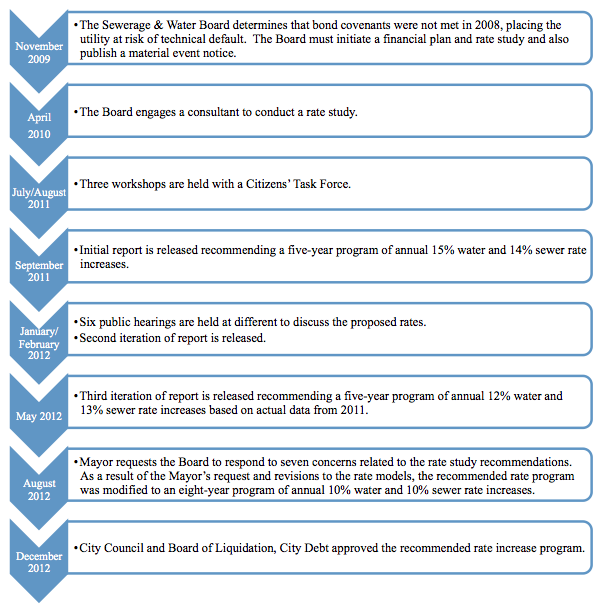Guest author Peiffer Brandt is the Chief Operating Officer at Raftelis Financial Consultants.
“New Orleans Sewerage & Water Board customers will see their monthly water and sewer rates more than double by 2020 after the City Council voted 5-2 Thursday to implement rate hikes on Jan. 1. Rates will jump 10 percent every year for the next eight years …” so began a December 6th Times Picayune article.
After undergoing a rate study that lasted more than two and a half years, the Sewerage & Water Board of New Orleans gained approval of a proposed program of rate increases that will raise a typical customers’ monthly bill from $48.45 to $103.98 (almost 115% increase) over an eight-year period. The Board’s Executive Management followed a twisting path to gain approval for the rate increases ultimately adopted, which were the sixth iteration developed over the course of the rate study.
Hopefully, most utilities will not have to follow this long, winding road to rate increases. However, it is valuable to understand the Sewerage and Water Board’s timeline and its keys to rate approval. Though not an enviable situation, it does demonstrate that it is possible for utilities to gain such a program of rate increases.
Rate Study Timeline
Keys to Approval
Efforts of the Board’s Executive Management – Marcia St. Martin, the Executive Director, and Bob Miller, the Deputy Director, expended tremendous effort to gain rate approval. In particular, they provided information to elected officials and stakeholders in a straightforward and comprehensive manner, which helped gain important public support.
Stakeholder Outreach – Relatively early in the process, the Mayor requested the formation of a Business Council Task Force to review the recommendations of the rate study. This task force evolved into a Citizens’ Task Force. Throughout the rate study and rate increase process, the Board gained support of the Citizens’ Task Force.
Support of the Mayor – Without the support of Mayor Landrieu, it is unlikely that the City Council would have approved the rates. Recognizing the importance of water and sewer service to the City and the condition of the systems, the Mayor had been an advocate for improving the systems and understood the need for rate increases. However, the Board’s Executive Management did not gain support from the Mayor until preparing a detailed series of responses to concerns raised by the Mayor.
Willingness to Compromise – The biggest challenge associated with the rate increase was not the increase itself, but rather concern regarding the governance and management of the utility. During the City Council hearing on the rate increases, even the strongest critic of the rate increase stated that additional revenues were needed. The Board agreed to support governance structure modifications, including a four-representative reduction in its membership, as part of garnering support for the rate increases.
Moving Forward
Getting the rates approved was quite a challenge and an accomplishment, but now the real work for the Board begins. The systems need significant improvements, which must be accomplished with the revenues generated from the rate increases. In addition, the Sewerage and Board also provides drainage service, for which the rate increases generate no new revenue. Due to cost shares associated with large drainage projects and operating responsibilities for other projects, such as the Permanent Pump stations at the Lakefront, the drainage systems revenue requirements are expected to increase almost threefold over the next ten years. The Board is working to determine how best to raise the additional drainage revenues.




2 Responses to “Sewerage & Water Board of New Orleans Gains Rate Increase Approval”
Multi-year Rate Increases: “Taking the Politics Out?” « Environmental Finance
[…] some utilities have convinced their board to approve multi-year increases, as in the case of New Orleans’ recent approval for the next eight years . But some utilities have been able to go even further. The Henry County Water and Sewer Authority […]
Marc Goncher
Sounds like New Orleans followed part of the Clean Water Atlanta roadmap circa 2003-2004.